
MYSTERY VIOLET LASER PEN
Mystery Violet Laser Pen, retail $(Unknown)
Manufactured by: (Unknown)
Last updated 03-11-21


(In reference to the padded envelope I saw meowing in my mailbox at 11:54am PDT 03-10-21:
{sung like the Foreigner song "Feels Like the First Time"}
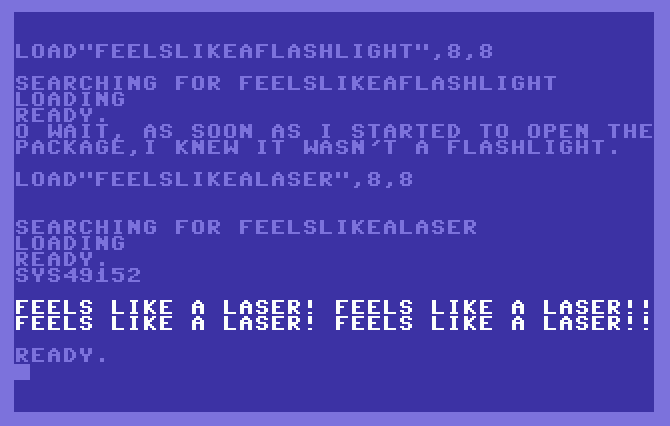
The Mystery Violet Laser Pen (hereinafter, probably just called a violet diode laser) is a violet-emitting, directly-injected laser. That is, it produces violet laser radiation directly, without the need for messy, fragile nonlinear crystals like those 532nm green laser pointers and the amberish-yellow and 473nm blue ones as well. It uses two AAA cells -- the same power source used in most other "pen-style" laser pointers and portable lasers.
It is labelled to have an output of 5mW of laser radiation at 405nm; it has a spectrographcally measured wavelength of 406.790nm and a measured power output of 44mW.
It comes in a handsome brass body with a black finish and chrome colored bezel, tailcap, and pocket clip.
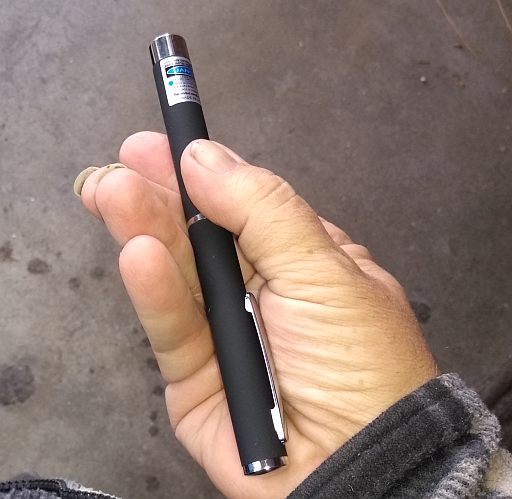 SIZE
SIZE

To get the laser to turn on, first be certain that there are a pair of AAA cells installed. If there isn't, then install them (see directly below), and THEN you can go irradiate something. 
Aim the laser well-away from your face first.  Press & hold down the button on the barrel for as long as you want or need the laser spot, and release pressure on the button to turn the laser back off.
Press & hold down the button on the barrel for as long as you want or need the laser spot, and release pressure on the button to turn the laser back off.

To change the batteries in this violet laser , unscrew the laser near the center, gently place the upper portion onto the floor in front of the stairs leading to the basement, and kick it down those stairs so that the piss ants with full bladders will think it's something to eat, find it unpalatable, drag it to the queen, who just sniffs at it, uranates all over it, and instructs the worker ants to do the same...O WAIT!!! THAT'S THE GOOD PART!!! So just set it aside instead. 
Tip the two used AAA cells out of the barrel and into your hand, and dispose of, recycle, or recharge them as you see fit.
Insert two new AAA cells into the barrel, button-end (+) positive first. This is the opposite of how batteries are installed in most flashlights, so please pay attention to polarity here.
Screw the front portion of the tube back on, and be done with it.
Aren't you glad that you didn't kick that front piece into the basement with all of those hungry ants that really had to piddle now? 
Unable to mesasure current usage due to how the laser was constructed.

This is a self-contained laser , and not a flashlight meant to be carried around, thrashed, trashed, and abused - so I won't try to drown it in the toliet tank, bash it against a steel rod or against a concrete porch, let my mother's big dog's ghost or my sister's kitty cats piddle (go poddy) on it, run over it with a 450lb Celebrity motorised wheelchair, stomp on it, use a small or medium ball peen hammer in order to bash it open to check it for candiosity, fire it from the cannoñata, drop it down the top of Mt. Erupto (I guess I've been watching the TV program "Viva Piñata" too much again  - candiosity is usually checked with a laser-type device on a platform with a large readout (located at Piñata Central {aka. "Party Central"}), with a handheld wand that Langston Lickatoad uses, or with a pack-of-cards-sized device that Fergy Fudgehog uses; the cannoñata (also located at Piñata Central) is only used to shoot piñatas to piñata parties away from picturesque Piñata Island, and Mt. Erupto is an active volcano on Piñata Island), send it to the Daystrom Institute for additional analysis, or perform other indecencies on it that a flashlight might have to have performed on it. So this section of the web page will be ***SIGNIFICANTLY*** more bare than this section of the web page on a page about a flashlight.
- candiosity is usually checked with a laser-type device on a platform with a large readout (located at Piñata Central {aka. "Party Central"}), with a handheld wand that Langston Lickatoad uses, or with a pack-of-cards-sized device that Fergy Fudgehog uses; the cannoñata (also located at Piñata Central) is only used to shoot piñatas to piñata parties away from picturesque Piñata Island, and Mt. Erupto is an active volcano on Piñata Island), send it to the Daystrom Institute for additional analysis, or perform other indecencies on it that a flashlight might have to have performed on it. So this section of the web page will be ***SIGNIFICANTLY*** more bare than this section of the web page on a page about a flashlight.
This is a directly-injected laser though, who's active components are the inverter circuit, the laser diode, and the collimating lens. So it should withstand accidents better than a DPSS (diode pumped solid state) laser - the type of laser assembly found in yellow (593.5nm), green (532nm) and blue (473nm) laser pointers. These lasers have several additional components (crystals, filters, etc.) in the optical train, and you can knock them out of alignment by doing little more than looking at them the wrong way. And if any of these components are nocked out of whack, you'll no longer get your yellow, green, or blue laser beam. 
Though you still do not want to intentionally drop your violet-emitting laser because it's a precision optical instrument.
Does this evaluation look an awful lot like the one I made for this laser?
Thought you'd say so.
That's because they're functionally, electrically, and physically very similar, so I was able to use its web page as a template for this one.
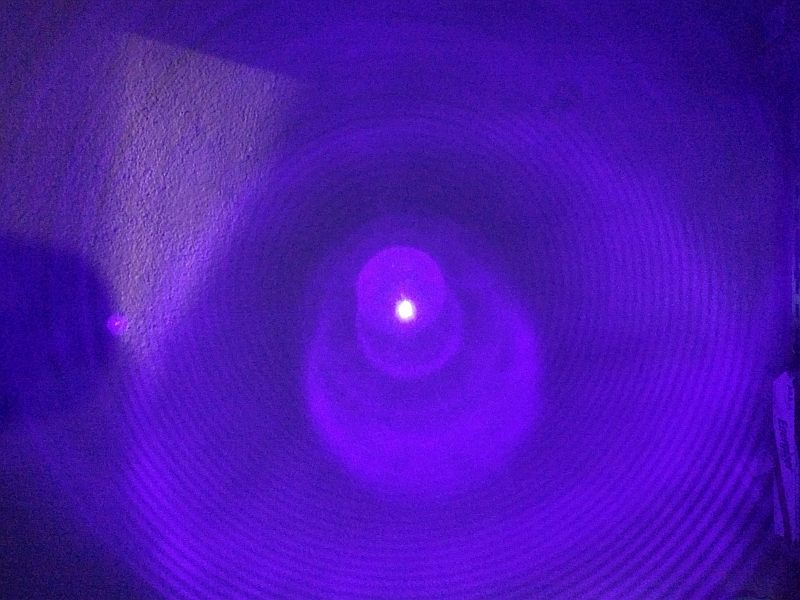
Beam photograph of this laser on a wall at ~12".
Beam image bloomed ***SIGNIFICANTLY***.
I deliberately photographed this in somewhat low daylight to help reduce image blooming!!!
However as you can plainly see, considerable image blooming did occur!!!
That white & blue color does not really exist; the spot appears to be a very deep royal purple to the eye.
Digital cameras have a tough time at these wavelengths.
And yes, I know that the colors purple and violet are two different critters, but the phrase "royal violet" would not make very much sense; however, most everybody knows what "royal purple" looks like.
Purple is a mixture of red & blue; violet is a spectral color, encompassing wavelengths of ~390nm to ~420nm.
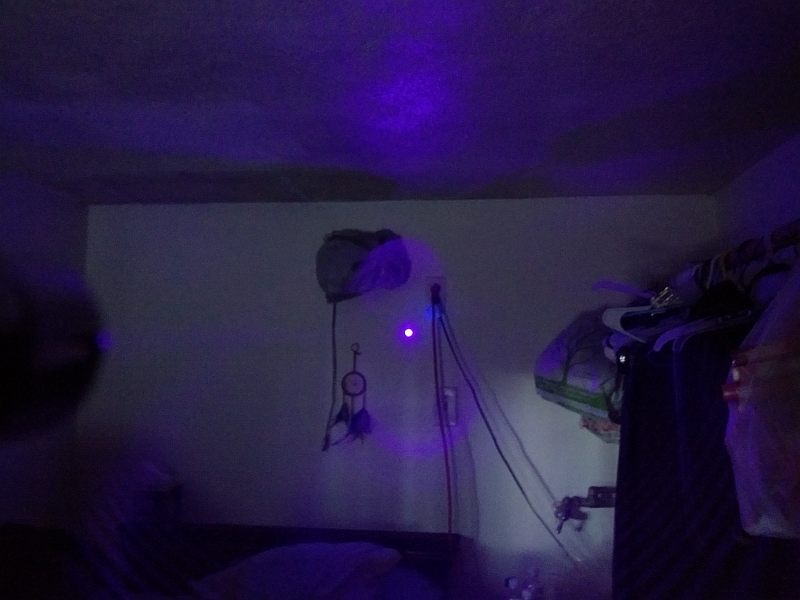
Beam photograph on a wall at ~10'.
Again, that white & blue color does not really exist.
Power output measures 44mW on a LaserBee AX laser power meter.
The beam appears to have a focus slightly beyond infinity (the lens is just a skosh too close to the diode) so the beam appears larger in diameter at aperture and has no "waisting" as you might see with most other "pen-style" lasers.
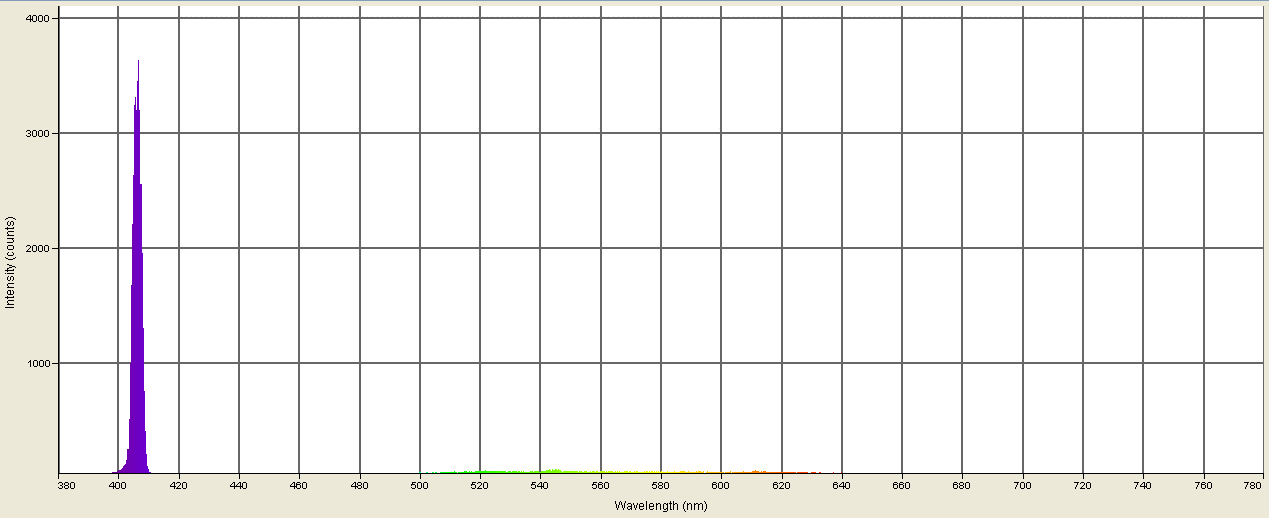
Spectrographic analysis of the Blu-ray laser diode in this product.
Wavelength appears to be ~405nm, which is within specification for the type of laser diode used in this laser.
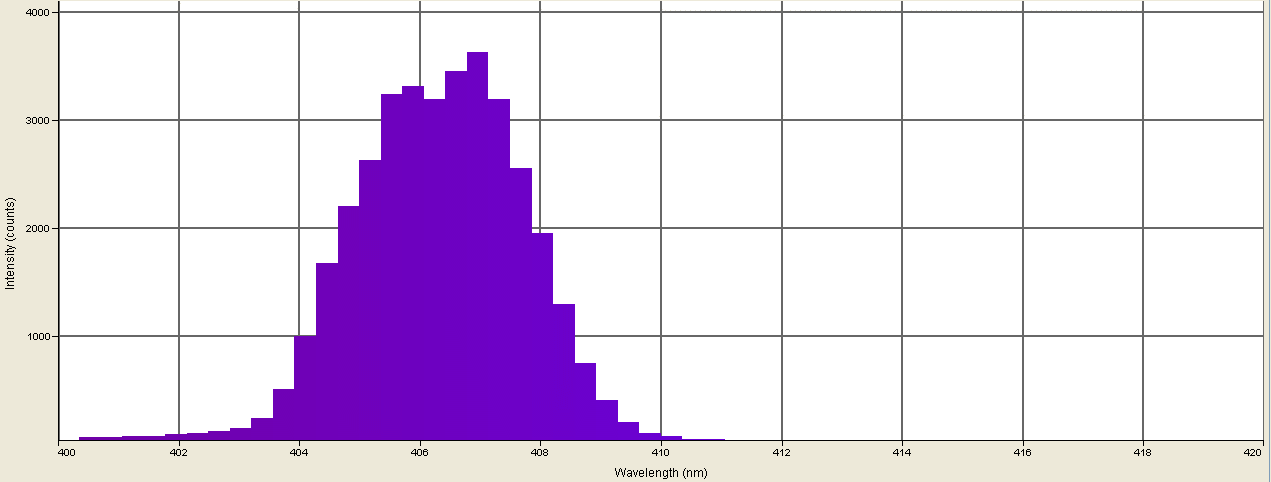
Same as above; but spectrometer's response narrowed to a band between 400nm and 410nm.
This shows that the wavelength is 406.790nm -- right about where I eyeballed it prior to spectroscopy.
The raw spectrometer data (tab-delimited that can be loaded into Excel) is at br53.txt
USB2000 Spectrometer graciously donated by P.L.
A beam cross-sectional analysis would normally appear here, but the ProMetric System
that I use for that test was destroyed by lightning in mid-July 2013. 
TEST NOTES:
Test unit showed up meowing in my mailbox totally unannounced late on the morning of 03-10-21.
I have decided to rate this little laser three stars.
The only real reasons that it did not receive five stars is because the claimed power output and the measured power output vary so greatly (claimed at <5mW, measured at 44mW) -- a rather severe no-no and because it is mislabelled which is also another no-no -- actually that's a HELL NO!!!
UPDATE 00-00-00:
PROS:
Color is very radiant & unusual for a handheld laser
Uses inexpensive and readily available batteries
Color is very radiant an unu...o wait, I said that already!!! 
CONS:
Just the usual suspects for laser modules/pointers - nothing that affects rating...actually, there is one little thing: it is labelled as a 5mW laser, but outputs a measured 44mW of laser radiation.
That's what nocked most of the stars off.

MANUFACTURER: Unknown
PRODUCT TYPE: Violet-emitting diode laser
LAMP TYPE: Sony Blu-ray laser diode
No. OF LAMPS: 1
BEAM TYPE: Very narrow spot
SWITCH TYPE: Momentary on/off button on barrel
CASE MATERIAL: Brass
BEZEL: Metal; laser & lens recessed into a hosel for them in its end
BATTERY: 2x AAA cells
CURRENT CONSUMPTION: Unable to measure
WATER- AND URANATION-RESISTANT: Light splatter-resistant at maximum
SUBMERSIBLE: For Christ sakes NO!!!
ACCESSORIES: None
SIZE: 153.30mm L x 14.10mm Dia. (not incl. button or pocket clip)
WEIGHT: 39g (1.38oz) incl. batteries; 16g (0.56oz.) empty
COUNTRY OF MANUFACTURE: China
WARRANTY: Unknown/not stated
PRODUCT RATING:


Mystery Violet Laser Pen *
Do you manufacture or sell an LED flashlight, task light, utility light, or module of some kind?
Want to see it tested by a real person, under real working conditions? Do you then want to see how your light did? If you have a sample available for this type of
real-world, real-time testing, please contact me at bdf1111@yahoo.com.
Please visit this web page for contact information.
Unsolicited flashlights, LEDs, and other products appearing in the mail are welcome, and it will automatically be assumed that you sent it in order to have it tested and evaluated for this site.
Be sure to include contact info or your company website's URL so visitors here will know where to purchase your product.
This page is a frame from a website.
If you arrived on this page through an outside link,you can get the "full meal deal" by clicking here.






 SIZE
SIZE


 Press & hold down the button on the barrel for as long as you want or need the laser spot, and release pressure on the button to turn the laser back off.
Press & hold down the button on the barrel for as long as you want or need the laser spot, and release pressure on the button to turn the laser back off.




 - candiosity is usually checked with a laser-type device on a platform with a large readout (located at Piñata Central {aka. "Party Central"}), with a handheld wand that Langston Lickatoad uses, or with a pack-of-cards-sized device that Fergy Fudgehog uses; the cannoñata (also located at Piñata Central) is only used to shoot piñatas to piñata parties away from picturesque Piñata Island, and Mt. Erupto is an active volcano on Piñata Island), send it to the Daystrom Institute for additional analysis, or perform other indecencies on it that a flashlight might have to have performed on it. So this section of the web page will be ***SIGNIFICANTLY*** more bare than this section of the web page on a page about a flashlight.
- candiosity is usually checked with a laser-type device on a platform with a large readout (located at Piñata Central {aka. "Party Central"}), with a handheld wand that Langston Lickatoad uses, or with a pack-of-cards-sized device that Fergy Fudgehog uses; the cannoñata (also located at Piñata Central) is only used to shoot piñatas to piñata parties away from picturesque Piñata Island, and Mt. Erupto is an active volcano on Piñata Island), send it to the Daystrom Institute for additional analysis, or perform other indecencies on it that a flashlight might have to have performed on it. So this section of the web page will be ***SIGNIFICANTLY*** more bare than this section of the web page on a page about a flashlight.







